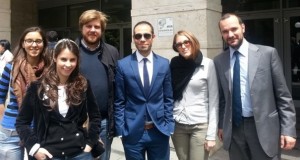 Daziano’s long-term educational goal is to train engineers to design solutions which are not only technically sound and environmentally sustainable but also attractive enough to be adopted by society in general.
Daziano’s long-term educational goal is to train engineers to design solutions which are not only technically sound and environmentally sustainable but also attractive enough to be adopted by society in general.
Microeconometrics of discrete choice CEE 6640, Spring (Graduate) Comprehensive review, from the fundamentals to advanced topics in microeconometrics of discrete choice. The empirical examples and case studies are centered on travel demand, including interactions with other systems (adoption of sustainable energy sources and eco-friendly behavior), but applications in marketing, industrial organization, telecommunications, and environment are also discussed. The class attracts graduate students not only from civil and environmental engineering, but also from economics, applied economics, operations research, and city and regional planning.
Watch this video in HD here.
Foundations of Complex Systems SYSEN 6000, Fall (Graduate) Daziano teaches one module on rational decision making.
Transportation Energy Systems CHEME 6667, Fall (Senior & MEng) The course focuses on understanding the link between transportation demand and energy consumption and on how to build a path toward conversion to sustainable energy sources. Analytical tools from transportation economics and engineering are covered to assess the energy consumption and environmental effects of long-term projects over complex, large-scale transportation systems.
Engineering Economics and Management CEE 3230, Spring (Senior) In this course students learn techniques to choose among competing design solutions from an economic perspective. Course contents include diverse topics of decision analysis and engineering economy (project evaluation), such as interest, money-time relationships and equivalent worth, rates of return, incremental analysis, accounting for depreciation and taxes, inflation, replacement decisions, dealing with uncertainty, and multi-attribute decision making.
Daziano has been invited to teach summer courses on microeconometrics of limited dependent variables (Department of Economics, Université Laval, Canada; Department of Economics, Catholic University of the North, Chile) and on sustainability, energy systems, and transportation in smart cities (Facoltà di Scienze Politiche, Università degli Studi Roma Tre).

Recent Comments